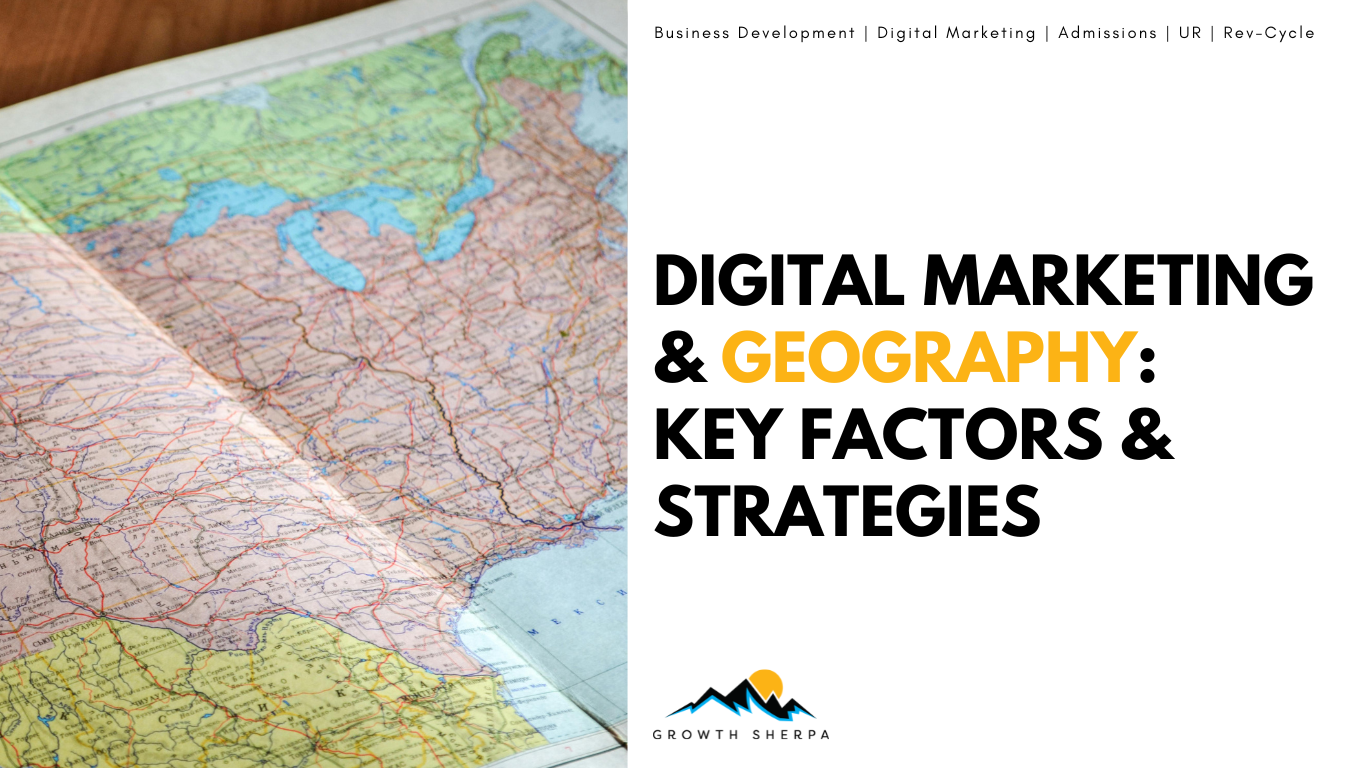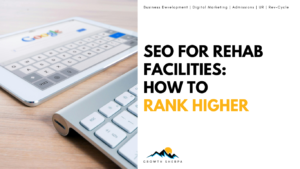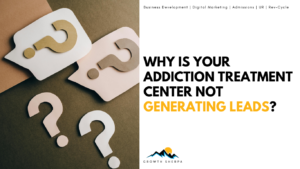When it comes to digital marketing for addiction treatment facilities, geography plays a significant role in determining your success. Whether you’re a small clinic in a rural area or a large, multi-location facility in a metropolitan hub, your geographical location will shape your marketing strategy in various ways. From the type of audience you’re targeting to the cost of advertising, geography influences how you should approach everything from search engine optimization (SEO) to pay-per-click (PPC) advertising.
In this blog, we’ll explore the key factors related to geography that can impact your digital marketing success, and we’ll provide strategies to help you address these challenges.
1. Population Density and Audience Reach
One of the most obvious ways geography affects digital marketing is population density. A facility located in a densely populated urban area will have a vastly different audience than one in a rural setting.
Urban Areas:
In urban locations, competition for digital visibility can be fierce. You’re likely to be competing with many other addiction treatment facilities, making it more challenging and expensive to stand out. However, the large population gives you access to a bigger audience, increasing your chances of attracting potential patients.
Strategy for Urban Facilities:
- PPC Ads: Given the high competition, investing in PPC can give you instant visibility in crowded search results. Geo-target your ads to the specific neighborhoods or ZIP codes where your audience is located.
- Localized SEO: Focus on local SEO by optimizing your Google My Business profile and creating content specific to your location. Use keywords that reflect the city or region you’re targeting, such as “drug rehab center in [City Name].”
- Reviews and Reputation Management: In competitive markets, online reviews and a strong reputation can set you apart. Encourage satisfied clients to leave reviews on Google or Yelp.
Rural Areas:
In rural areas, you might not face as much direct competition, but the pool of potential patients is smaller, and people may be willing to travel long distances to receive care. This means your marketing strategy should emphasize a broader geographic reach.
Strategy for Rural Facilities:
- Target a Larger Area: Instead of focusing solely on your local town, expand your reach to cover a larger radius, including nearby cities or regions.
- Content Focused on Accessibility: Emphasize your facility’s unique features that make it worth traveling for, such as specialized programs, serene settings, or holistic treatment approaches. Consider creating content that addresses the challenges of seeking treatment from a distance.
- Referral Networks: Building relationships with local healthcare providers and creating referral networks can be a powerful tool in rural areas. Digital marketing can support these efforts by making it easy for providers to refer patients through online forms or information-sharing platforms.
2. Cost of Digital Advertising
Geography also impacts the cost of digital advertising, especially for PPC campaigns. Larger cities and areas with higher demand for addiction treatment services generally have higher costs-per-click (CPC) because of increased competition. Conversely, rural areas or regions with fewer facilities may offer lower CPC but have fewer searches and potential leads.
High-Cost Markets:
In high-cost markets like Los Angeles, New York, or Miami, competition for keywords related to addiction treatment can drive up advertising costs significantly.
Strategy for High-Cost Markets:
- Long-Tail Keywords: Instead of bidding on highly competitive terms like “drug rehab center,” focus on long-tail keywords that are less competitive but still relevant, such as “luxury rehab center in [City]” or “dual diagnosis treatment in [Neighborhood].”
- Retargeting Campaigns: Implement retargeting strategies to reach users who have already visited your site. This is a cost-effective way to stay top-of-mind without continually paying high costs for new clicks.
- Organic Marketing: While PPC costs may be high, SEO is a long-term strategy that can reduce your dependence on paid advertising. Focus on building high-quality, geographically targeted content to drive organic traffic.
Low-Cost Markets:
If you’re in a less competitive region, your PPC costs may be lower, but your audience size may also be limited.
Strategy for Low-Cost Markets:
- Broaden Your PPC Targeting: If competition and CPC are lower, you can afford to broaden your targeting range to include a wider geographic area.
- Capitalize on Lower CPC: Take advantage of lower PPC costs to run multiple ad campaigns or test different ad formats. This flexibility can help you fine-tune your strategy without significantly increasing your budget.
3. Local Preferences and Cultural Differences
Geographical regions often come with specific cultural norms, healthcare preferences, and stigmas around addiction treatment. Understanding these regional differences is essential for crafting effective messaging and targeting the right audience.
Urban and Suburban Preferences:
In urban and suburban areas, there may be a stronger focus on convenience, quick access to care, and modern, evidence-based treatment methods. These audiences may prioritize outpatient services or telehealth options that allow them to maintain their daily routines.
Strategy for Urban and Suburban Areas:
- Promote Outpatient and Telehealth Services: If your facility offers flexible outpatient or virtual treatment options, make sure these services are prominently featured in your digital marketing.
- Leverage Local Events: Urban areas often have more public health campaigns or events that your facility can sponsor or participate in. Use digital marketing to promote these partnerships, which can boost your credibility and visibility in the community.
Rural and Small-Town Preferences:
In more rural areas, addiction treatment may carry a greater stigma, and patients may be more concerned with privacy and confidentiality. Many people in rural communities may also value holistic or alternative treatment methods.
Strategy for Rural and Small-Town Areas:
- Emphasize Confidentiality: Address privacy concerns in your messaging, highlighting how your facility maintains strict confidentiality for all patients.
- Focus on Holistic and Faith-Based Approaches: If your facility offers holistic or faith-based treatment options, be sure to feature this prominently in your digital content. These approaches may resonate more with rural or small-town audiences.
4. The Impact of Regional Health Policies
Different states and regions often have varying health policies that can directly impact your marketing strategy. Some states may have stricter advertising regulations for addiction treatment facilities, while others may offer more flexibility.
Navigating Advertising Regulations:
Facilities in states with strict advertising regulations must be careful about how they market their services, particularly in terms of claims made about treatment outcomes.
Strategy for Regulated Markets:
- Focus on Educational Content: Instead of making direct claims about treatment success rates, create content that educates your audience about the treatment process, your team’s qualifications, and the benefits of different treatment approaches.
- Build Trust through Transparency: Use your website to provide transparent information about what potential clients can expect from their treatment journey, focusing on the quality of care and support rather than promising specific outcomes.
5. Travel Patterns and Accessibility
For some rehab facilities, geography can work in your favor by positioning your center as a destination for treatment. In other cases, limited accessibility can be a barrier to attracting new clients.
Destination Rehab Centers:
Some facilities are located in scenic, remote areas that may appeal to individuals looking for a retreat-like atmosphere for their recovery.
Strategy for Destination Centers:
- Highlight the Location: Use digital marketing to showcase the beauty and tranquility of your surroundings. Create visual content like videos, virtual tours, or galleries that highlight the natural setting of your facility.
- Cater to Out-of-State Clients: Consider creating specific campaigns targeting out-of-state clients who may be willing to travel for high-quality care in a serene environment.
Locally Focused Centers:
For facilities that are less reliant on out-of-state patients, focusing on local convenience and accessibility is key.
Strategy for Local Centers:
- Geo-Targeting Ads: Use geo-targeted PPC ads to ensure you’re reaching potential clients within driving distance of your facility.
- Local SEO Optimization: Ensure that your local SEO efforts are strong by claiming and optimizing your Google My Business listing, and encourage positive reviews from local patients to build your online reputation.
Geography Is a Key Factor in Your Marketing Strategy
Whether your addiction treatment facility is located in a bustling urban center or a quiet rural area, geography plays a critical role in shaping your digital marketing strategy. From population density and local preferences to the cost of advertising and regional health policies, there are numerous factors to consider. By understanding how geography affects your digital marketing success, you can tailor your strategies to better connect with your target audience, increase patient admissions, and grow your facility.
At Growth Sherpa, we specialize in helping addiction treatment facilities develop customized marketing strategies that take geography into account. Whether you need assistance with PPC campaigns, SEO, or localized content, we’re here to help you succeed—no matter where your facility is located. Let’s work together to create a digital marketing plan that’s perfectly suited to your unique geographic challenges and opportunities.




